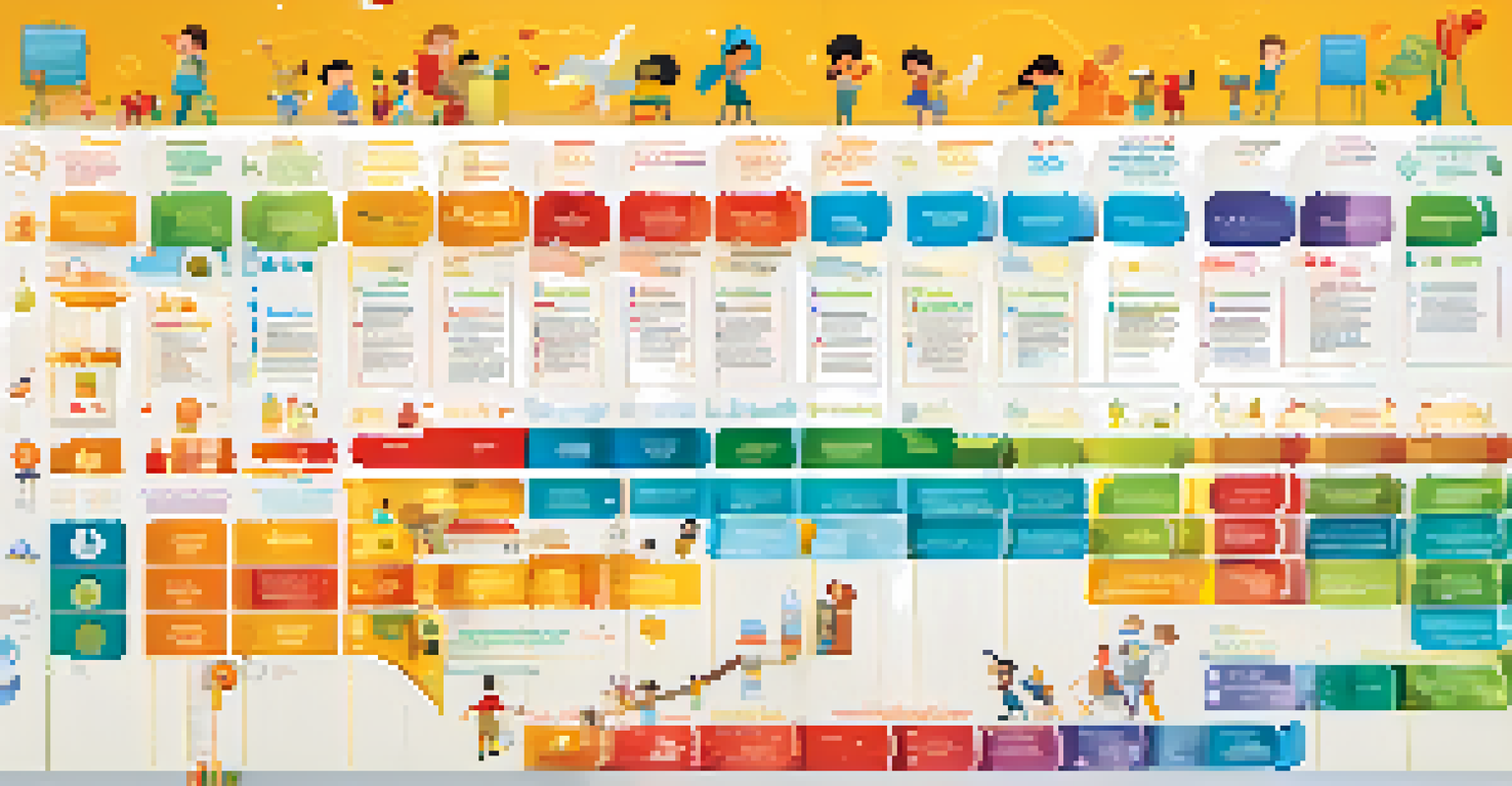Vaccines and Children: Why Early Vaccination is Crucial

Understanding Vaccines and Their Role in Health
Vaccines are biological substances that help the body develop immunity against specific diseases. They work by mimicking an infection, prompting the immune system to produce antibodies without causing the illness. This process not only protects the vaccinated individual but also contributes to herd immunity, which safeguards those who cannot be vaccinated.
Vaccines are the tugboats of preventive medicine.
For children, vaccines are particularly important because their immune systems are still developing. By receiving vaccinations early, children are protected from potentially severe and life-threatening diseases such as measles, mumps, and whooping cough. This proactive approach to health can prevent outbreaks and ensure a healthier community overall.
Moreover, vaccines have a long history of success. For instance, the introduction of the polio vaccine in the 1950s dramatically reduced the incidence of this debilitating disease. Such historical examples reinforce the critical role of vaccines in protecting both individual and public health.
The Recommended Vaccination Schedule for Children
The Centers for Disease Control and Prevention (CDC) provides a recommended vaccination schedule for children, which outlines the specific vaccines and the ages at which they should be administered. This schedule is designed to ensure that children receive their vaccines at the optimal times for maximum effectiveness. For instance, many vaccines are given in early childhood, some as early as two months old.

Following this schedule is crucial because it ensures that the child’s immune system is ready to respond effectively to the vaccines. Delays in vaccination can leave children vulnerable to diseases during crucial developmental periods. Parents should work closely with their pediatricians to stay on track with these vaccinations.
Vaccines Protect Individual & Community
Vaccines not only help individuals build immunity but also contribute to herd immunity, protecting those who cannot be vaccinated.
It’s also important to note that some vaccinations require multiple doses for full protection. For example, the hepatitis B vaccine is given in a series of three shots. Adhering to the schedule helps ensure that children receive the complete series, thus providing them with robust immunity.
Addressing Common Concerns About Vaccination
Many parents have concerns about the safety and necessity of vaccines, often driven by misinformation. It's important to understand that vaccines undergo rigorous testing and monitoring to ensure they are safe and effective for children. Health organizations worldwide, including the World Health Organization (WHO), endorse vaccines as a critical component of public health.
The best way to protect your child is to vaccinate them against preventable diseases.
Some parents worry about the timing of vaccines, fearing too many shots at once may overwhelm their child's immune system. However, research shows that the immune system can handle multiple vaccines simultaneously, as it encounters a vast array of pathogens daily. This capability highlights the importance of early vaccination to build immunity.
Moreover, discussing any concerns with a healthcare provider can help clarify misconceptions. Pediatricians can provide evidence-based information and support to ease worries, ensuring parents feel confident in their vaccination choices.
The Impact of Vaccination on Public Health
Vaccination plays a significant role in protecting not just individuals but entire communities. High vaccination rates create herd immunity, which occurs when a large portion of the population becomes immune to a disease, thus limiting its spread. This protection is vital for those who cannot be vaccinated, such as infants or individuals with certain medical conditions.
For example, the widespread use of the measles vaccine has led to a dramatic decline in measles cases worldwide. A community with high vaccination rates can effectively stop outbreaks, protecting vulnerable populations and maintaining overall public health. This communal aspect of vaccination underscores its importance beyond individual benefits.
Follow Vaccination Schedules Closely
The CDC recommends specific vaccination schedules to ensure children receive timely protection against diseases.
Additionally, vaccines can lead to the eradication of diseases. Smallpox, once a leading cause of death globally, was completely eradicated through a successful vaccination campaign. Such achievements demonstrate the powerful impact of vaccines on public health and the importance of continued vaccination efforts.
Vaccination Myths Debunked
Despite the wealth of scientific evidence supporting vaccination, numerous myths persist. One common myth is that vaccines can cause the diseases they’re meant to prevent. In reality, vaccines contain inactivated or weakened forms of the virus or bacteria, which cannot cause the disease but can stimulate an immune response.
Another myth is that vaccines are unnecessary because diseases have become rare. While it's true that diseases like polio and measles are less common due to vaccines, they can resurface if vaccination rates drop. Maintaining high vaccination coverage is essential to prevent outbreaks of these diseases, even in areas where they seem to have disappeared.
It's crucial for parents to seek information from credible sources rather than relying on anecdotal reports. Engaging with healthcare professionals and accessing resources from reputable health organizations can help dispel these myths and promote informed decisions about vaccination.
The Role of Pediatricians in Vaccination
Pediatricians play a vital role in guiding parents through the vaccination process. They provide education on the importance of vaccines, address any concerns, and ensure that children receive their vaccinations on schedule. Building a trusting relationship with a pediatrician can help parents feel more confident in their decisions regarding their child's health.
During routine check-ups, pediatricians assess a child's health and readiness for vaccinations. They can also offer personalized advice based on a child's medical history and any specific concerns parents may have. This individualized approach helps ensure that each child receives the best care possible.
Healthcare Providers Are Key Resources
Pediatricians play an essential role in educating parents about vaccinations, addressing concerns, and keeping track of schedules.
Additionally, pediatricians often keep track of vaccination records, making it easier for parents to stay on schedule. They can also inform families about upcoming vaccines and any new recommendations that may arise, making them an invaluable resource in a child's health journey.
The Future of Vaccination and Children's Health
As we look to the future, the role of vaccines in children's health continues to evolve. Ongoing research and development aim to create new vaccines that can protect against emerging diseases. This proactive approach is vital in today's rapidly changing world, where new health threats can arise at any time.
Moreover, advancements in technology may lead to more effective vaccination methods, such as needle-free vaccines or vaccines that require fewer doses. These innovations could enhance accessibility and compliance, ensuring that more children receive the protection they need.

Ultimately, the commitment to vaccinating children remains critical for safeguarding public health. By prioritizing early vaccination, we can continue to protect future generations from preventable diseases and promote a healthier world.